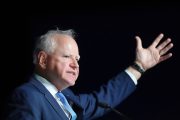President Donald Trump’s national security advisor, Michael Flynn (shown), resigned from his post Monday in the midst of a controversy over a late-December conversation with Russian ambassador Sergey Kislyak.
Flynn is accused of having given Kislyak assurance, or at least the impression, that the incoming Trump administration would lift sanctions the Obama administration had imposed on Russia in retaliation for that country’s alleged interference in last year’s presidential election. The two men spoke by telephone on December 29, the same day the sanctions were announced. The next day, Russian President Vladimir Putin announced that his government would not retaliate against the United States. Trump then responded on Twitter, saying Putin had made a “great move” and adding, “I always knew he was very smart!”
The Flynn-Kislyak conversation, if it occurred as alleged, could therefore be seen as a violation of the Logan Act, a 1799 law that prohibits private citizens from engaging in communications with foreign governments “with intent to influence the measures or conduct of any foreign government … in relation to any disputes or controversies with the United States, or to defeat the measures of the United States.”
The Washington Post first reported on Flynn’s conversation with Kislyak on January 13. At the time, the Trump transition team stated that the conversation’s purpose was to set up a call between Putin and Trump after Trump’s inauguration.
Two days later, on CBS’s Face the Nation, Vice President-elect Mike Pence acknowledged that Flynn and Kislyak had communicated with each other on more than one occasion but denied that they had ever discussed the sanctions. He said it was “strictly coincidental” that the two had spoken on the day the sanctions were imposed. “They did not discuss anything having to do with the United States’ decision to expel diplomats or impose censure against Russia,” he added.
According to the Post, as late as last Wednesday, Flynn was still denying that he had discussed the sanctions with Kislyak. The very next day, however, his spokesman told the paper that Flynn “indicated that while he had no recollection of discussing sanctions, he couldn’t be certain that the topic never came up.”
The Federal Bureau of Investigation started looking into Flynn’s communications with Kislyak, which began during the election campaign, because of the timing of the December 29 call, the Post reported on the basis of conversations with “nine current and former officials who were in senior positions at multiple agencies at the time of the calls.”
The newspaper continued:
All of those officials said Flynn’s references to the election-related sanctions were explicit. Two of those officials went further, saying that Flynn urged Russia not to overreact to the penalties being imposed by President Barack Obama, making clear that the two sides would be in position to review the matter after Trump was sworn in as president.
“Kislyak was left with the impression that the sanctions would be revisited at a later time,” said a former official.
A third official put it more bluntly, saying that either Flynn had misled Pence or that Pence misspoke. An administration official stressed that Pence made his comments based on his conversation with Flynn. The sanctions in question have so far remained in place.
The Post did note, however, that “several officials emphasized that while sanctions were discussed, they did not see evidence that Flynn had an intent to convey an explicit promise to take action after the inauguration.”
On Friday, Trump told reporters he would “look into” the matter. Administration officials were noticeably reticent about discussing it on weekend television shows. Trump ignored questions about Flynn that were shouted at him as he left a press conference with Canadian Prime Minister Justin Trudeau Monday afternoon.
Later that day, White House Press Secretary Sean Spicer told reporters, “The president is evaluating the situation. He’s speaking to the vice president relative to the conversation the vice president had with Gen. Flynn, and also speaking to various other people about what he considers the single most important subject there is: our national security.”
“Asked whether the president had been aware that Flynn might discuss sanctions with the Russian envoy, Spicer said, ‘no, absolutely not,’” according to the Associated Press.
Flynn resigned Monday evening. In his resignation letter, he did not comment on whether he had discussed the sanctions with Kislyak. He did, however, confess to having “inadvertently briefed the Vice President Elect and others with incomplete information regarding” his conversations with Kislyak. “I have sincerely apologized to the president and the Vice President, and they have accepted my apology,” he wrote.
Flynn’s resignation was probably the result of a loss of trust rather than actual legal jeopardy. No one has ever been prosecuted under the Logan Act. Officials told the Post that “seeking to build such a case against Flynn would be daunting” and that “aggressive enforcement” of the law “would probably discourage appropriate contact.” They pointed out that “prominent Americans in and out of government are so frequently in communication with foreign officials that singling out one individual — particularly one poised for a top White House job — would invite charges of political persecution.”
Indeed, as NPR observed, Flynn, whom Obama fired from his post as director of the Defense Intelligence Agency in 2014, had made enemies in both the Defense Department and the Central Intelligence Agency, and thus there might well be “unsettled scores within the intelligence community.” Might the leaks about Flynn’s conversations with Kislyak — the sources for the stories were all anonymous officials — be payback? Furthermore, might Flynn’s (and Trump’s) desire for rapprochement with Russia, in contrast to the intelligence community’s ongoing belligerence toward the Bear, be reason enough to target him?
Hostility to Trump from Obama administration holdovers may also have played a part in bringing Flynn down. Former Acting Attorney General Sally Yates, who was fired by Trump for refusing to enforce his travel ban, was among those ordering the recording of Flynn’s phone calls and warning the White House that Flynn wasn’t telling the whole truth.
Whatever the reason for his departure, Flynn is no longer part of the Trump administration. Lieutenant General Joseph Keith Kellogg, Jr., will take over as acting national security advisor, the White House said.
Photo: AP Images




